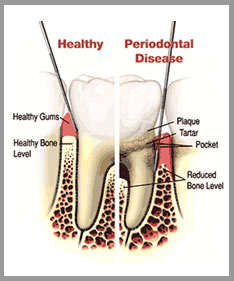Periodontics (Gum
Disease Treatment)
Periodontal (gum) diseases,
including gingivitis and periodontitis, are serious infections
that, left untreated, can lead to tooth loss. The word periodontal
literally means "around the tooth." Periodontal
disease is a chronic bacterial infection that affects the
gums and bone supporting the teeth. Periodontal disease can
affect one tooth or many teeth. It begins when the bacteria
in plaque (the sticky, colorless film that constantly forms
on your teeth) causes the gums to become inflamed.
 Many
people will have a small amount of periodontitis, which gradually
increases with age. However approximately 15% of the population
will have a significant degree of periodontitis. The destruction
of the tooth's supporting tissues caused by periodontitis
gets worse over time when left untreated, and is often seen
more severely in the 45+ age group. However the different
types of periodontitis may affect people of all ages. Many
people will have a small amount of periodontitis, which gradually
increases with age. However approximately 15% of the population
will have a significant degree of periodontitis. The destruction
of the tooth's supporting tissues caused by periodontitis
gets worse over time when left untreated, and is often seen
more severely in the 45+ age group. However the different
types of periodontitis may affect people of all ages.
The risk for periodontitis is increased with
poor oral hygiene, smoking, diabetes, a family history of
periodontitis and a range of medical conditions, in particular
those affecting the immune system.
Gingivitis
Gingivitis is the mildest form of periodontal
disease. It causes the gums to become red, swollen, and bleed
easily. There is usually little or no discomfort at this stage.
Gingivitis is often caused by inadequate oral hygiene. Gingivitis
is reversible with professional treatment and good oral home
care.
Periodontitis
Untreated gingivitis can advance to periodontitis.
With time, plaque can spread and grow below the gum line.
Toxins produced by the bacteria in plaque irritate the gums.
The toxins stimulate a chronic inflammatory response in which
the body in essence turns on itself, and the tissues and bone
that support the teeth are broken down and destroyed. Gums
separate from the teeth, forming pockets (spaces between the
teeth and gums) that become infected. As the disease progresses,
the pockets deepen and more gum tissue and bone are destroyed.
Often, this destructive process has very mild symptoms. Eventually,
teeth can become loose and may have to be removed.
Treatment
In the vast majority of cases the progression of gum disease
can be arrested with appropriate care. Management of gum disease
becomes more difficult and less predictable the more advanced
the disease. Therefore, the sooner periodontitis is diagnosed
and treated the better. Regular dental examinations are important
to check for the presence of gum disease.
The cause of gum disease is bacteria. To manage
it, the bacteria must be reduced to a level the body's defense
mechanisms can handle. Treatment classically involves:
1. achieving the best possible home care
2. professional cleaning of the teeth above and below the
gum line (into the pockets) to remove the plaque and hard
deposits (calculus / tartar), and
3. regular reviews
4. trying to remove risk factors such as smoking.
Gum disease causes permanent damage to the supporting tissues;
therefore the aim of treatment is to stop the progression
of the disease through controlling the bacteria. This is an
ongoing, lifelong activity.
Your general dentist is trained in managing periodontal problems.
They may also use a hygienist to assist in your care. You
may be referred to a Periodontist if your dentist considers
your condition needs more advanced care. A specialist periodontist
has gained additional qualifications and experience to satisfy
the requirements of the State Dental Board and may therefore
use the title "Periodontist".
Prevention is best. To a large extent periodontitis can be
prevented by good oral hygiene and early intervention when
problems are identified. See your dentist regularly.
Visit your dentist, who will examine your gums as part of
a normal dental check-up. X-rays are often needed to help
diagnose any gum problems. Good dental hygiene is one of the
most important factors in preventing gum disease. Your dentist
will show you proper brushing and flossing techniques that
will help ensure healthy teeth and gums.
You may need to be referred to a Periodontist who is a specialist
in treating gum disease. Treatment involves careful, deep
cleaning of the teeth to remove the cause of the problem.
This can be done with local anaesthetic.
back to top
|





